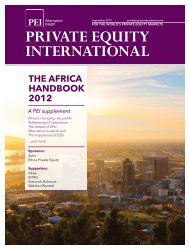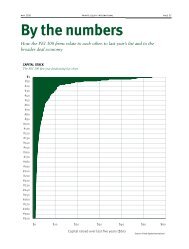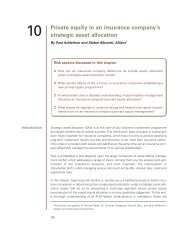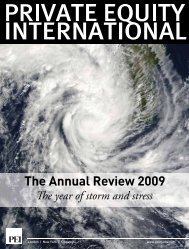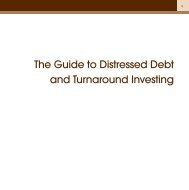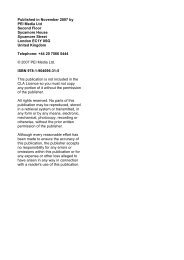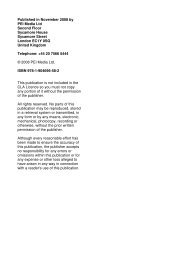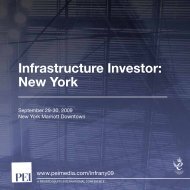THE ANNUAL REVIEW 2010 - PEI Media
THE ANNUAL REVIEW 2010 - PEI Media
THE ANNUAL REVIEW 2010 - PEI Media
You also want an ePaper? Increase the reach of your titles
YUMPU automatically turns print PDFs into web optimized ePapers that Google loves.
private equity annual review <strong>2010</strong> pa g e 87<br />
Slim pickings<br />
d i s t re s s e d i n v e s t i n g<br />
What happened to the feast of distressed investment opportunities expected to flood<br />
the US and UK markets? Amanda Janis reports<br />
Take a trip through the <strong>PEI</strong> archives back<br />
to autumn 2006 and you’ll be reminded<br />
that private equity distressed investors were<br />
beginning to rub their hands in anticipatory<br />
glee, noting that the boom cycle’s high valuations,<br />
excess liquidity and low interest rates<br />
couldn’t continue in perpetuity.<br />
Indeed, one year on, the term “credit<br />
crunch” was beginning to appear regularly<br />
in our pages – but no one was prepared<br />
for the severity of the global economic<br />
crisis that was to unfold over the next two<br />
years, causing large financial institutions to<br />
collapse, stock markets to plummet and the<br />
entire global financial system to be called<br />
into question.<br />
The severity of the crisis – and the<br />
subsequent responses by banks and central<br />
governments –dampened a lot of the<br />
anticipatory glee.<br />
Josh Wolf Powers, founding partner<br />
of New York-based turnaround and<br />
restructuring firm Blue Wolf Capital<br />
Management, has been predicting an<br />
avalanche of opportunities related to distress<br />
for nearly five years. He’s still waiting<br />
for the wave of conventional distressed<br />
opportunities, he says.<br />
“There just has not been the avalanche of<br />
companies in the US filing for Chapter 11<br />
bankruptcy protection,” Wolf Powers says.<br />
“And when they have filed for Chapter 11,<br />
they’ve typically been far further gone, so<br />
the Chapter 11 has resulted in a liquidating<br />
[Chapter] 7 or has been a reorganisation<br />
opportunity available primarily to the<br />
lenders, to the senior creditors or secured<br />
lenders.”<br />
That resulted in a number of<br />
distressed debt specialists like Oaktree<br />
Capital Management, Anchorage Capital<br />
Partners, Towerbrook Capital Partners and<br />
Wayzata Investment Partners taking over<br />
companies (often from private equity firm<br />
sponsors), but Wolf Powers says “even those<br />
opportunities haven’t been as numerous as<br />
anyone imagined”.<br />
banks and bailouts<br />
“Things that are good for most investors,<br />
and most citizens” aren’t so wonderful for<br />
those hoping to find distressed investment<br />
bargains, Howard Marks, chairman of Oaktree,<br />
wrote in <strong>PEI</strong>’s recent book, The Definitive<br />
Guide to Distressed Debt and Turnaround<br />
Investing.<br />
Thus various government bailouts and<br />
stimulus packages over the past two years<br />
– which one veteran distressed investor<br />
dubbed “the socialist bailout game where<br />
the consequence of taking absurd risk was<br />
forgiven” – have helped restore confidence<br />
and revive credit markets, but suppressed<br />
the supply of distressed investment<br />
opportunities.<br />
However, it’s the actions – or rather<br />
lack thereof – of lenders that industry<br />
insiders most frequently pointed to as a<br />
principal reason why the expected plethora<br />
of distressed investment deals didn’t quite<br />
come to fruition.<br />
“Lenders – in particular banks, but<br />
also hedge funds and other non traditional<br />
lenders – chose rather than to exit their<br />
uneconomic holdings, to essentially ‘live<br />
to fight another day’ by neither admitting<br />
defeat nor funding continued investment,”<br />
says Wolf Powers.<br />
Reeling from mortgage-related losses<br />
and caught out by the suddenness of the<br />
downturn, many banks hadn’t taken<br />
reserves against corporate loans that<br />
should have been marked down and become<br />
distressed investment candidates, says David<br />
Blechman, who in August 2009 left Sun<br />
Capital to join distress- and turnaroundfocused<br />
Tower Three Partners. “If it’s on<br />
your books at par, you’re not going to<br />
transact on it. You have to mark it down<br />
first,” he says.<br />
“So in late ‘08 and the first part of ‘09,<br />
a lot of those lenders just weren’t willing<br />
to do anything yet. And meanwhile, to<br />
the extent that it was [private equity and<br />
hedge] funds holding the bank debt, more<br />
and more of those funds were willing to<br />
own the company,” Blechman says. “So there<br />
were far, far fewer actual distressed private<br />
equity control buyouts of these companies<br />
as a result of those two things.”<br />
The situation has been the same on<br />
both sides of the Atlantic. And while many<br />
lenders in Europe increasingly started to<br />
divest some of these assets in the latter<br />
part of <strong>2010</strong>, industry participants say<br />
they weren’t likely to attract many true<br />
distressed investors now, either because<br />
the assets were no longer “distressed” given<br />
the market rally seen in the first part of<br />
<strong>2010</strong>, or because they’ve essentially become<br />
“zombie companies” while sitting on the<br />
banks’ balance sheets.<br />
timing it right<br />
Before the subprime crisis fully hit, distress<br />
hadn’t really begun to manifest itself save<br />
for in certain sectors like those related to<br />
housing. “So there were some opportunities<br />
there, before fall 2008, but it was all<br />
complicated by the fact that you had no<br />
visibility as to what the future was likely<br />
to hold with respect to that sector,” Wolf<br />
Powers recalls. “You saw that you were on<br />
the edge of a cliff but you didn’t know how<br />
high the cliff was or how fast you were<br />
going to fall. So that made it very hard to<br />
invest in that situation.”




